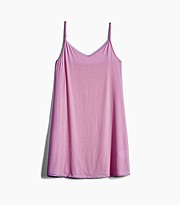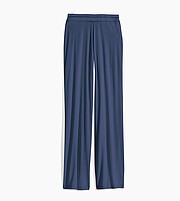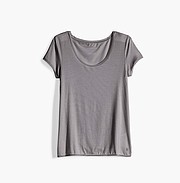TECHNOLOGY
The Secret is in the Science for Saint Haven Soft
Creating a line of clothing that is nontoxic, hypoallergenic, antimicrobial, soft, breathable and ecologically sound was the goal of Saint Haven’s Jacqueline Sacks, but once she researched the process of apparel production, she wanted to do more.
With one child who has eczema, another who has sensory issues and a third who simply likes soft fabrics, Sacks wanted simple, quality basics that were affordable and gentle on the skin.
“Saint Haven was born because I wanted families to trust a name again,” she said. “I want everyone to associate the name with quality, comfort and the type of company that is doing good through products that are sustainably produced.”
In December, Sacks launched her brand of women’s and children’s basics, which relies on a proprietary fabric blend she named Saint Haven Soft. Using a finely tuned combination of Tencel Modal fabric with four-way interlock stretch that is treated with an enzyme wash, Sacks focused on producing her own beechwood blend of fabric to create her designs.
“The way we dye and treat the fabric makes us unique,” Sacks said. “That is something that I haven’t personally seen elsewhere and we worked really hard to achieve for this kind of hand.”
The main challenge she encountered when developing the fabric was the perfect ratio of durability, softness, weight and washable properties. Designing for families, Sacks wanted to create fabric that was strong enough to endure the demands of daily life yet remain soft enough for sensitive skin while looking beautiful.
“There are different components of our fabric that you’ll find in other fabrics, such as the same composition,” she explained. “You might even find a similar dyeing process or a similar but not exact treatment, but all of these things come together to make it Saint Haven Soft.”
When thinking about how to process the fabric, Sacks was extremely particular about how to approach creating material that yielded a soft hand. Rather than finishing her textiles with silicone to soften the touch, she wanted to use an alternative, which is how she chose an enzymatic wash to follow the dyeing process.
“With other companies that have something similar, often they use silicone, which makes fabrics softer,” she said. “Technically it’s safe to use, but I don’t want it on my clothes or my kids’ clothes.”
Other clothing brands might rely on similar techniques to process their fabrics, but Sacks notes that her entire production process sets apart the brand from others.
“It’s not necessarily a secret sauce. It’s the right mixture or recipe,” she said. “Even changing one of our manufacturers that provides our fiber to be woven in a certain way—if that is off, it changes the durability.”
Saint Haven Soft is produced in Portugal because Sacks wanted to manufacture the fabric according to old-world standards in production and business practices. Forging trusted relationships with her partners was extremely important because it would allow Sacks to move closer to her goal of providing apparel whose name would be recognized as a trustworthy clothing brand.
“The reputation is worth more than money. Finding good people is important and critical,” she said. “These factories have been owned for hundreds of years by these families, who understand each part of the recipe.”
Saint Haven Soft will be used in the company’s new offerings, which will include men’s designs, hoodies and blazers. Saint Haven is available online at www.sainthaven.com but will expand from a direct-to-consumer model to welcoming select retail partners throughout 2019. Wholesale prices range from $15 to $35.

























